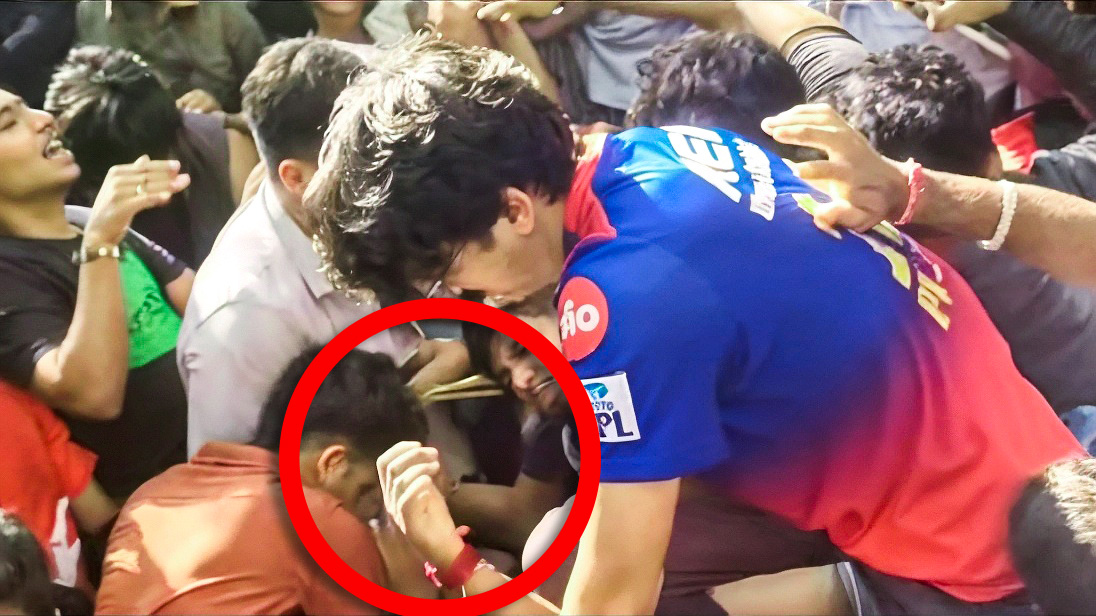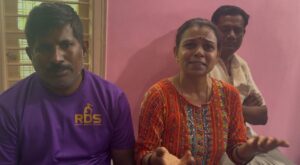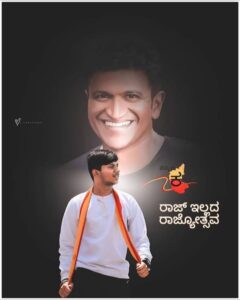Published Jun 07, 2025 | 7:00 PM ⚊ Updated Jun 11, 2025 | 9:12 AM

That hand, rising from the chaos, was Prajwal aka Appu's--reaching out, screaming for help. But no one stopped. Feet rushed past, over him, around him
Synopsis: Prajwal was excited. One, he had recently landed a job, and two, his favorite team won the IPL trophy. Oblivious of the danger lurking outside the Chinnaswamy Stadium in Bengaluru, he, too, went to felicitate the team—and never returned to keep his promise. Two days later, his mother saw a photograph of a single hand sticking out of a heap of human bodies, and burst into tears…
Number 18 has much significance to cricketer Virat Kohli. It represents a personal loss, cosmic coincidences, and an emotional journey.
For many others in India, where cricketers are considered gods, Kohli’s jersey number has become a symbol of grit, fearlessness, and brilliance.
Coincidentally, it took Royal Challengers Bengaluru 18 years to win its first IPL cup, despite several near-misses and disappointments.
In a cold chamber of Vydehi Hospital, a mother, too, came across the number 18. It was etched on the T-shirt her missing son had worn when he left their house at Yelahanka to watch his favourite team returning with the coveted trophy, on 4 June.
The young man did not return home. Instead, his mother found him trampled, bloodied and lifeless in the morgue, wearing the same jersey with the number 18 etched on it.
Prajwal, 22, known as Appu, had woken up early from a segmented sleep on 4 June. He was excited, like many others the previous night, as his favourite team, RCB, defeated Kings XI Punjab in a high-octane final in Ahmedabad.

Pavithra and Ganesh mourning the loss of their son Appu.
The celebrations had begun the moment Punjab’s chase ended six runs short of Bengaluru’s 190. Prajwal and his friends took out a rally, sang and danced till late into the night.
The young man felt the celebrations at Chikkaballapura were not enough. He wanted to see his hero, Kohli.
Pavithra BR and Ganesh GM, both daily-wage labourers, were at work on 4 June morning, when Prajwal rang up his father. “I got the pass for the rally,” Ganesh did not miss the boyish excitement in his son’s voice. “I want to see Virat Kohli,” he said.
Ganesh did not share the same excitement. Deep in his heart, he felt something was wrong. “There will be a huge crowd, Appu. Don’t go,” he advised.
“Don’t worry,” Appu comforted his father. “I will be alright and be back before you return home,” he added while leaving their house at 8 am, wearing the same jersey he had worn overnight.
In Bengaluru that day, everything went wrong for Appu.
Pavithra had always held her children’s hands whenever they needed her.
A day after Appu’s funeral, she was shown a photograph of the stampede outside Bengaluru’s M Chinnaswamy Stadium, which killed 11 people, including her son.
What struck her in the photograph was a hand — fingers limp as if they had resigned from clawing the air — sticking out from a heap of human bodies, as several feet ran over the fallen. She noticed the hand, the kautuka — the ritualistic protection threat tied around the wrist — and burst out in a scream.
The mother realised that she was not around when her son stretched out his hand, seeking help — and breath.
“That’s my son’s hand! Look closely… that’s his hand, raised for help! Why didn’t anyone lift him?” she wailed, as others searched for words to comfort her.
In the photograph, the hand remained extended, frozen in time as if a stark reminder of a system that failed Karnataka.
A heady scent of incense sticks led to the small house at Gopalli in Chikkaballapura, the family’s home village. The front door opened to a smaller room, with a wooden cot occupying most of the space. Soft, questioning glances went across the room, where silence stood cold and resigned.
Till a few days ago, the room was full of life, with conversations and laughter. Instead of the scent of incense sticks failing to mask the faint mustiness and wilted flowers, the aroma of nati koli saru (free-range chicken curry) being cooked had often filled the nostrils. Nati koli saru was Appu’s favourite.
“That’s my Appu,” Pavithra pointed at the photograph, even as Ganesh gave a furtive glance and sighed.
Pauses spoke more as Pavithra recalled the darkest day in her life. “He went with his friends, promising to be back before 4 pm,” she said.
Pavithra was working when her sister called her over the phone. Before leaving for Bengaluru, an excited Appu had informed his aunt about seeing his heroes in life and blood.
The woman had seen the news of the Bengaluru stampede on television. After repeated failed attempts to contact Appu, she dialled her sister, Pavithra, to know if her nephew was alright.
Pavithra panicked. She frantically tried to contact Appu, but her calls went unanswered. But then, she had alerted Ganesh.
The couple kept calling Appu on his mobile. Late in the evening, a male voice answered the call. “He enquired about me and asked how I was related to the phone’s owner. My heart stopped when I heard the Cubbon Park police were answering the call,” she recalled, trying to compose herself.
The man told Pavithra that the phone was found lying at the scene of the stampede. After the call was over, the couple tried to contact Appu’s friends. None replied.
Pavithra and a few relatives left immediately. “I first went to the police station,” Pavithra said. “I thought he would call from there if he had been caught in the crowd or had lost his phone. The police didn’t give us the phone. They asked us to search the hospitals.”
“Go to Bowring Hospital,” the words still echo in her mind. Pavithra still had not lost hope. “Appu might have suffered some injuries or fallen unconscious,” she told herself.
Pavithra’s hope of seeing her son safe was rekindled when her search at the Bowring Hospital turned futile. “I thought he must be in some other place, maybe gone into the stadium, and had dropped his phone in the rush.”
However, the police directed her to check the Vydehi Super Speciality Hospital. Ganesh had then yet joined the search party.
“They checked the list and said there is ‘no Prajwal’. I felt hopeful. But then, the doctor said there was an unidentified body of a boy…,” she left it incomplete, as her eyes welled up.
The mother rushed in, hoping not to see her son. “Something pulled me in there. I rushed to that place, praying that it would not be Appu. The moment they moved the white sheet, his feet became visible. I recognised those feet. I gave birth to those feet. I used to massage them when he returned tired from work. It was my child, my Appu,” she cried aloud.
Pavithra collapsed as the hospital staff removed the shroud. “There were bruises and blood. His face was crushed. But his jersey was still there, intact. That number 18. He died as a fan. And this country didn’t protect him,” the mother wailed.
The kautuka, too, was intact around his wrist.
Ganesh and Pavithra had never missed a day at work. They earned ₹800 each daily, which kept the family going, besides meeting the educational expenses of Appu and his sister.
The family was dreaming of better days after Appu got a job recently. “I will be made a permanent staff member in a few months. I am also trying for a better job also. You and Amma need not work any more,” Ganesh recalled Appu’s words.
“Appu told me that he would take care of the family. I thought I could rest a bit. He had many plans,” he added.
One of his dreams was to buy his sister a laptop and a new mobile phone. “I am saving for buying them,” he had told his father.
Appu had just started working at Toyota Kirloskar, his first real job. “I’ll progress from here and will earn lakhs. All you two have to do is take rest,” the younger man was confident.
The couple did take a day off from work — for Appu’s funeral.
His sister refused to step out of the room. “She doesn’t like media attention,” her cousin said. “It won’t bring back our brother. She was very, very attached to Appu Anna. We don’t know how to console her,” she added.
Appu was not just the younger son of a poor family. He was the spirit of Gopalli.

Prajwal aka Appu was Puneet Rajkumar fan.
“He was like a festival,” his cousin Jyothi (name changed) said. “He danced like Puneet Rajkumar, acted like him, sang like him, looked like him, behaved like him and went away abruptly like him,” she said between sobs.
Coincidentally, Puneet Rajkumar, who passed away on 29 October 2021, was affectionately called Appu by his fans.
Appu’s cousins, six of them, were eager to show Appu’s Instagram page. ‘Prajwal_Kannadiga’, his profile name read.
Instagram had videos of Appu dancing to the tunes of Puneet Rajkumar songs, dancing with his father to the beats of drums, dancing to the tunes of Kantara for an event, and winning prizes.
One of the songs he had sung turned prophetic, his relatives felt. ‘Kanadante maayavadanu…namma Shiva Kailasa serikondanu (Shiva disappeared and reached Kailasam),’ he sang. His aunts and uncles passed the phone around, saying, “It’s like he knew. It was like he was saying goodbye. He’s gone. Disappeared. In heaven. Gone too soon!”
The cousins showed us a video of Appu dancing barefoot in the village hall during last year’s Ganesha festival.
“He was always up for mischief, but his heart was golden,” said another cousin.
Even after shifting to the city for work, he came home to Gopalli for every festival. “Each time, he asked for the same dish, nati koli saru, extra spicy. Even this Ugadi, I cooked it for him,” his aunt said, wiping her tears with the end of her saree.
At the Bengaluru hospital, the family begged authorities not to conduct a postmortem examination.
“We knew what had happened. He was crushed. We saw his face. His hand. Why cut him more?” Pavithra asked. “They treated him like a number. Like a form to be filled, not a son who was everything to someone,” the mourning mother has forgotten that the law is blind.
They took him home in a van, covered in a white sheet, in silence. “The boy I carried for nine months was carried back like a parcel.” Pavithra could not hide her sorrow.
The family doesn’t want revenge. They want accountability. “There were no barricades. No crowd control. It was a death trap. My son went with permission, with a pass. Why wasn’t he protected?” his mother asked.
And then that image came. The image that would haunt the family forever. A single, raised hand, almost buried beneath other bodies. “That was his hand,” Pavithra repeated as if in a trance. “He was screaming. And people were stepping on him.”
A brief silence later, she regained her voice: “Where is humanity? How can you step on a fallen one? Was his life less worthy because we are poor?”
No politician has witnessed the family. No minister has spoken to them, nor have any words of condolences been offered. No answers to what had led to the chaos that killed their son.
Instead, there were promises that the family saw on the news. Compensation of ₹10 lakh from the government, ₹10 lakh from the RCB team and ₹5 lakh from the Karnataka State Cricket Association.
“We don’t have any words to talk about the compensation. What do we say? It’s not going to bring back my son. This system has failed my son. This system, this government, failed parents who worked hard to educate their son, to make him independent. This system failed a cricket fan. This system failed a boy who had promised to return home safe before 4 pm,” the grieving mother raged.
(Edited by Majnu Babu).

